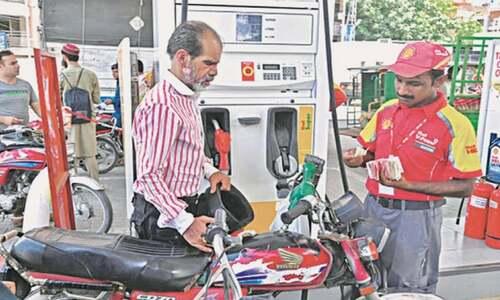THE article by Khurram Hussain ‘False start, faltering economy’ (March 28), contends that the finance minister tried to ‘spin’ data on private sector credit offtake, to show improvement in the economy. The tone of the article is disappointing and inappropriate.
The data quoted by the finance minister is accurate and private sector credit offtake in FY19 continues to be significantly higher than of last year. The latest data from State Bank of Pakistan shows that private sector credit offtake during July-Feb FY19 was Rs580 billion, an increase of 54 per cent from same period last year.
Mr Hussain’s point, that a rise in private sector credit is not an indicator of rising confidence in the markets is a bizarre argument that defies conventional economic wisdom. Any student of economics can enlighten the author that a rise in private sector credit is seen as a leading indicator of greater economic activity and growth.
The writer contends that the higher credit offtake is due to the rising cost of doing business including the sharp depreciation in the rupee. This is partially true.
The cost of doing business has marginally increased and thus may partially explain the higher credit offtake. Hence, part of 54pc growth might be attributable to 30pc devaluation in the currency over the last 15 months. However, the author is missing the bigger picture as growth in private credit is significantly higher than the rise in cost of doing business.
The writer claims that the recently published SBP report shows a story completely “opposite to what the finance minister tried to spin”.
However, a look at the report shows that the export-related activity went up. From a sectoral perspective, textiles’ working capital loans contributed more than half to the overall increase in manufacturing loans in Q2-FY19, as firms scaled up their raw material purchases amid strong domestic demand as well as rising exports to the European Union.
In particular, the volume of value added exports grew by double digits in H1-FY19 (Chapter 5).
Although manufacturing concerns in textile, cement and power generation cumulatively borrowed Rs 52.5 bn in H1-FY19, non-manufacturing sectors such as transport, storage and communication, construction and agriculture diluted the impact by retiring long-term loans during the period. Resultantly, fixed investment loans could grow only Rs 2.2 bn in Q2-FY19, compared to Rs 19.8 bn in Q2-FY18.
Within manufacturing, textile firms continued to borrow for BMR and benefited from the SBP’s subsidised refinance schemes such as LTFF, which constituted around 78 pc of the increase in the sector’s long term loans during H1-FY19, compared to 39 pc in the same period last year. This trend was also consistent with growing import of textile machinery during H1-FY19. Meanwhile, the cement industry increased its long-term borrowing by Rs19.7 bn to finance its on-going capacity expansion projects.
The economy is recovering from a balance of payment crisis which necessitated corrections to restore the external sector imbalances.
Spokesman
Ministry of Finance
Islamabad
Published in Dawn, March 30th, 2019










































Dear visitor, the comments section is undergoing an overhaul and will return soon.